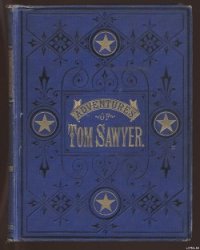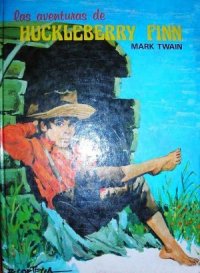The Adventures of Huckleberry Finn - Twain Mark (читать книги онлайн регистрации TXT) 📗
All the stores was along one street. They had white domestic awnings in front, and the country people hitched their horses to the awning-posts. There was empty drygoods boxes under the awnings, and loafers roosting on them all day long, whittling them with their Barlow knives; and chawing tobacco, and gaping and yawning and stretching-a mighty ornery lot. They generly had on yellow straw hats most as wide as an umbrella, but didn't wear no coats nor waistcoats, they called one another Bill, and Buck, and Hank, and Joe, and Andy, and talked lazy and drawly, and used considerable many cuss words. There was as many as one loafer leaning up against every awning-post, and he most always had his hands in his britches-pockets, except when he fetched them out to lend a chaw of tobacco or scratch. What a body was hearing amongst them all the time was:
«Gimme a chaw 'v tobacker, Hank.»
«Cain't; I hain't got but one chaw left. Ask Bill.»
Maybe Bill he gives him a chaw; maybe he lies and says he ain't got none. Some of them kinds of loafers never has a cent in the world, nor a chaw of tobacco of their own. They get all their chawing by borrowing; they say to a fellow, «I wisht you'd len' me a chaw, Jack, I jist this minute give Ben Thompson the last chaw I had»-which is a lie pretty much everytime; it don't fool nobody but a stranger; but Jack ain't no stranger, so he says:
«YOU give him a chaw, did you? So did your sister's cat's grandmother. You pay me back the chaws you've awready borry'd off'n me, Lafe Buckner, then I'll loan you one or two ton of it, and won't charge you no back intrust, nuther.»
«Well, I DID pay you back some of it wunst.»
«Yes, you did-'bout six chaws. You borry'd store tobacker and paid back nigger-head.»
Store tobacco is flat black plug, but these fellows mostly chaws the natural leaf twisted. When they borrow a chaw they don't generly cut it off with a knife, but set the plug in between their teeth, and gnaw with their teeth and tug at the plug with their hands till they get it in two; then sometimes the one that owns the tobacco looks mournful at it when it's handed back, and says, sarcastic:
«Here, gimme the CHAW, and you take the PLUG.»
All the streets and lanes was just mud; they warn't nothing else BUT mud-mud as black as tar and nigh about a foot deep in some places, and two or three inches deep in ALL the places. The hogs loafed and grunted around everywheres. You'd see a muddy sow and a litter of pigs come lazying along the street and whollop herself right down in the way, where folks had to walk around her, and she'd stretch out and shut her eyes and wave her ears whilst the pigs was milking her, and look as happy as if she was on salary. And pretty soon you'd hear a loafer sing out, «Hi! SO boy! sick him, Tige!» and away the sow would go, squealing most horrible, with a dog or two swinging to each ear, and three or four dozen more a-coming; and then you would see all the loafers get up and watch the thing out of sight, and laugh at the fun and look grateful for the noise. Then they'd settle back again till there was a dog fight. There couldn't anything wake them up all over, and make them happy all over, like a dog fight-unless it might be putting turpentine on a stray dog and setting fire to him, or tying a tin pan to his tail and see him run himself to death.
On the river front some of the houses was sticking out over the bank, and they was bowed and bent, and about ready to tumble in, The people had moved out of them. The bank was caved away under one corner of some others, and that corner was hanging over. People lived in them yet, but it was dangersome, because sometimes a strip of land as wide as a house caves in at a time. Sometimes a belt of land a quarter of a mile deep will start in and cave along and cave along till it all caves into the river in one summer. Such a town as that has to be always moving back, and back, and back, because the river's always gnawing at it.
The nearer it got to noon that day the thicker and thicker was the wagons and horses in the streets, and more coming all the time. Families fetched their dinners with them from the country, and eat them in the wagons. There was considerable whisky drinking going on, and I seen three fights. By and by somebody sings out:
«Here comes old Boggs!-in from the country for his little old monthly drunk; here he comes, boys!»
All the loafers looked glad; I reckoned they was used to having fun out of Boggs. One of them says:
«Wonder who he's a-gwyne to chaw up this time. If he'd a-chawed up all the men he's ben a-gwyne to chaw up in the last twenty year he'd have considerable ruputation now.»
Another one says, «I wisht old Boggs 'd threaten me, 'cuz then I'd know I warn't gwyne to die for a thousan' year.»
Boggs comes a-tearing along on his horse, whooping and yelling like an Injun, and singing out:
«Cler the track, thar. I'm on the waw-path, and the price uv coffins is a-gwyne to raise.»
He was drunk, and weaving about in his saddle; he was over fifty year old, and had a very red face. Everybody yelled at him and laughed at him and sassed him, and he sassed back, and said he'd attend to them and lay them out in their regular turns, but he couldn't wait now because he'd come to town to kill old Colonel Sherburn, and his motto was, «Meat first, and spoon vittles to top off on.»
He see me, and rode up and says:
«Whar'd you come f'm, boy? You prepared to die?»
Then he rode on. I was scared, but a man says:
«He don't mean nothing; he's always a-carryin' on like that when he's drunk. He's the best naturedest old fool in Arkansaw-never hurt nobody, drunk nor sober.»
Boggs rode up before the biggest store in town, and bent his head down so he could see under the curtain of the awning and yells:
«Come out here, Sherburn! Come out and meet the man you've swindled. You're the houn' I'm after, and I'm a-gwyne to have you, too!»
And so he went on, calling Sherburn everything he could lay his tongue to, and the whole street packed with people listening and laughing and going on. By and by a proud-looking man about fifty-five-and he was a heap the best dressed man in that town, too-steps out of the store, and the crowd drops back on each side to let him come. He says to Boggs, mighty ca'm and slow-he says:
«I'm tired of this, but I'll endure it till one o'clock. Till one o'clock, mind-no longer. If you open your mouth against me only once after that time you can't travel so far but I will find you.»
Then he turns and goes in. The crowd looked mighty sober; nobody stirred, and there warn't no more laughing. Boggs rode off blackguarding Sherburn as loud as he could yell, all down the street; and pretty soon back he comes and stops before the store, still keeping it up. Some men crowded around him and tried to get him to shut up, but he wouldn't; they told him it would be one o'clock in about fifteen minutes, and so he MUST go home-he must go right away. But it didn't do no good. He cussed away with all his might, and throwed his hat down in the mud and rode over it, and pretty soon away he went a-raging down the street again, with his gray hair a-flying. Everybody that could get a chance at him tried their best to coax him off of his horse so they could lock him up and get him sober; but it warn't no use-up the street he would tear again, and give Sherburn another cussing. By and by somebody says:
«Go for his daughter!-quick, go for his daughter; sometimes he'll listen to her. If anybody can persuade him, she can.»
So somebody started on a run. I walked down street a ways and stopped. In about five or ten minutes here comes Boggs again, but not on his horse. He was a-reeling across the street towards me, bare-headed, with a friend on both sides of him a-holt of his arms and hurrying him along. He was quiet, and looked uneasy; and he warn't hanging back any, but was doing some of the hurrying himself. Somebody sings out:



